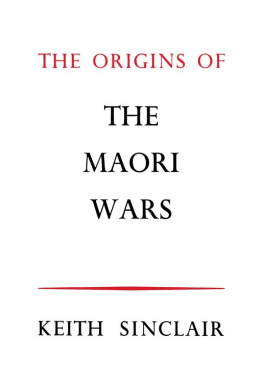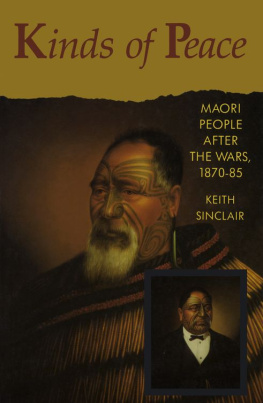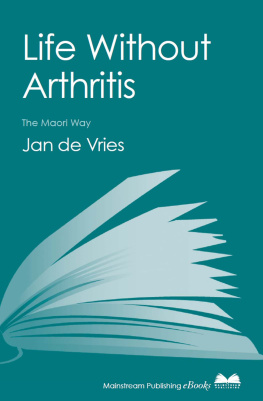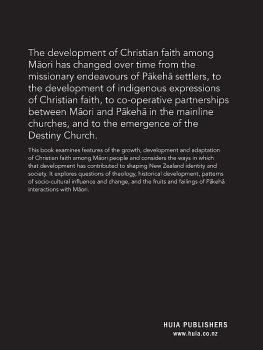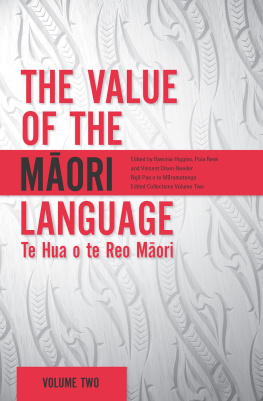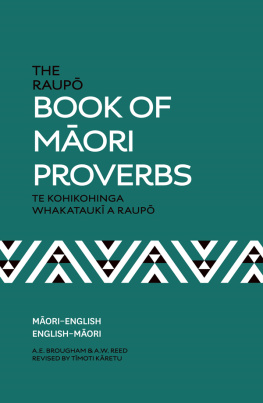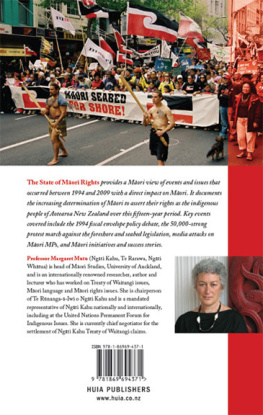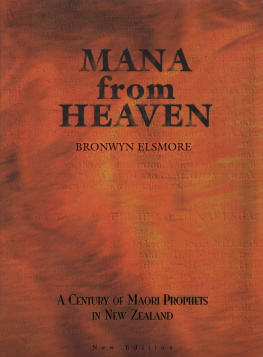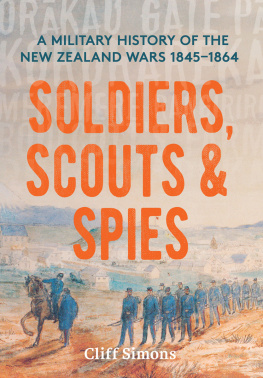Keith Sinclair - The Origins of the Maori Wars
Here you can read online Keith Sinclair - The Origins of the Maori Wars full text of the book (entire story) in english for free. Download pdf and epub, get meaning, cover and reviews about this ebook. year: 1975, publisher: Oxford University Press, genre: Politics. Description of the work, (preface) as well as reviews are available. Best literature library LitArk.com created for fans of good reading and offers a wide selection of genres:
Romance novel
Science fiction
Adventure
Detective
Science
History
Home and family
Prose
Art
Politics
Computer
Non-fiction
Religion
Business
Children
Humor
Choose a favorite category and find really read worthwhile books. Enjoy immersion in the world of imagination, feel the emotions of the characters or learn something new for yourself, make an fascinating discovery.
- Book:The Origins of the Maori Wars
- Author:
- Publisher:Oxford University Press
- Genre:
- Year:1975
- Rating:5 / 5
- Favourites:Add to favourites
- Your mark:
- 100
- 1
- 2
- 3
- 4
- 5
The Origins of the Maori Wars: summary, description and annotation
We offer to read an annotation, description, summary or preface (depends on what the author of the book "The Origins of the Maori Wars" wrote himself). If you haven't found the necessary information about the book — write in the comments, we will try to find it.
The Origins of the Maori Wars — read online for free the complete book (whole text) full work
Below is the text of the book, divided by pages. System saving the place of the last page read, allows you to conveniently read the book "The Origins of the Maori Wars" online for free, without having to search again every time where you left off. Put a bookmark, and you can go to the page where you finished reading at any time.
Font size:
Interval:
Bookmark:
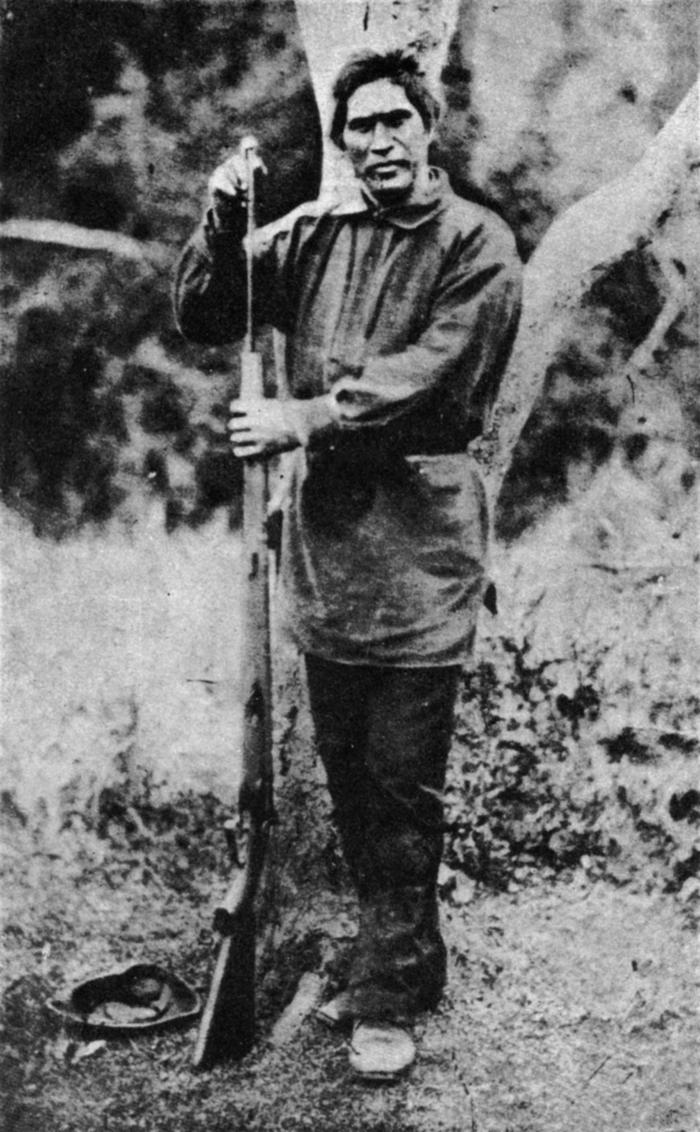
WIREMU TAMIHANA TARAPIPIPI c. 1862
TO MY FATHER
AND TO THE MEMORY OF MY MOTHER
HereafteragreatnationwilloccupytheseIslands,andwithwonderandgladnesstheywilllookbackupontheworksofthosemenwhoassistedinfoundingtheircountry;andwhenthechildreninthosetimesasktheirparentswhowerethemenwhofoundedsogreatacountry,theywillanswerthem,themenwhodidthesethingsintheoldentimeswereourancestors.Yes,thosethingsweredone,notbyourEuropeanancestorsalone,butpartlyalsobyourancestorswhoweretheoriginalnativeinhabitantsoftheseIslands,andthentheywilltellthemmanynames,andamongstthemthoseofmyfriends.
Governor Greys reply to the farewell address of Ngatitoa, Ngatiraukawa, and Atiawa chiefs at Otaki, 1853.
TheillustrationshavebeenprovidedbytheAlexanderTurnbullLibrary,Wellington,theAucklandPublicLibrary,andtheAucklandInstituteandMuseum,forwhosehelptheauthorismostgrateful.
I N N EW Z EALANDS BRIEF COLONIAL HISTORY LITTLE HAS HAP pened on an epic scale; even the Maori wars were minor episodes in the affairs of an empire. Nevertheless, those campaigns were the most dramatic event to interrupt, from within, the relatively smooth tenor of the countrys existence. It has been as an interruption to the work of founding a new state, rather than as a formative struggle, that the colonists and their descendants have generally regarded the wars. Few, except Maoris and historians, have cared to recognize their influence. At once civil war, rebellion, and conquest, the wars roused the usual bitterness of such conflicts , and were marked by the savagery of racial strife. Their immediate legacy was recurrent denunciation and recrimination. Yet they formed what now seems a necessary prelude to the growth of a new nation which embraces two races.
Much of the polemics during and after the fighting was concerned with the Waitara land purchase, which immediately led to war. Three generations have speculated on this subject, adding confusion to what was already obscure, so that it has appeared the most mysterious event in New Zealand history.
This book is not meant to provide a general history of New Zealand from Cook to Te Kooti: its aim is to consider how the wars came about. In following this theme, the plan I have adopted is to sketch in outline the remoter sources of the war and to describe much more thoroughly the situation in the late eighteen-fifties . The discussion becomes more detailed as the story nears 1860. In the first eight chapters an attempt is made to analyse the chief tendencies which were making for war in the years after 1840. In the later chapters dealing with the events which immediately preceded war a closer attention to chronology and individuals has been considered necessary. There was, in any case, little possibility of ignoring the individual altogether, and of discussing the wars entirely in abstract and general terms. In 1860 the country gave a home to a small community of about fifty-six thousand Maoris and rather more Europeans. The number of people who took part in public life was so small that the historian naturally thinks of them as individuals rather than as groups or classes. Furthermore, very many of them have left collections of letters or journals so that we possess more information than is usual about their motives and behaviour. Certainly the pages of letters bear but a pale imprint of the passions of a century ago. Nevertheless, it has seemed possible to show, to some extent, how the social forces considered in the first chapters influenced the individual actions and choices described in the remainder.
In Chapter XII, following an account of the beginning of fighting in Taranaki, I pause to sum up, and to discuss the role of individuals in producing the war. Although to raise such an issue is to confront problems leading far beyond the confines of this work, to ignore them would leave the task of explaining the Maori wars half-finished. It has seemed necessary, without pretending to offer final judgment, at least to reflect on some of the considerations relevant to this question.
The narrative is then resumed to consider the events leading up to the invasion of the Waikato in 1863. This account stops at that point, rather than with the actual beginning of warfare in 1860, because events in Taranaki and the Waikato were so closely linked as often to be mutually explanatory. In 1863 the major campaigns had commenced. However, I have felt justified in describing events after 1860 in a more summary fashion than those connected with the Waitara purchase.
Apart from brief and often misleading comments in general text-books and contemporary accounts of a partisan nature, no study of the present subject exists. Perhaps only now that the papers of the chief actors are available is a detailed discussion possible. Fire and shipwreck and other accidents have destroyed many of the relevant records, but what must be a substantial proportion of them can be pieced together from private and public sources.
In addition to the personal papers left by the chief people with whom this work is concerned, I have made use of much new or little-known material in the Public Record Office, London, in the Dominion Archives, Wellington, and in the archives of several Government Departments. Of secondary sources, only Sir John Gorsts MaoriKing, published in 1864, and an unpublished thesis by Mr R. W. S. Fargher, have been of any considerable assistance.
I wish to thank Dame Ethel Looke King, of Caenshill, Surrey, for permitting me to read the papers of her father, Sir Thomas Gore Browne, and Mrs O. S. B. Connell, Mount Eden, Auckland, for allowing me to read those of her father, Judge T. H. Smith. I should also like to record my gratitude to the numerous archivists and librarians and public servants who have invariably been so helpful and tolerant.
The translations cited from Maori are those made at the time and filed or published with the originals. In a few cases I have used modern translations, for which I am indebted to my colleague, Dr B. G. Biggs, and in one case, to the Department of Maori Affairs.
This study has been carried out since 1947, in England and New Zealand. In late 1945 and 1946 I was engaged, also in both hemispheres, in a study of the opinions and activities in New Zealand of the Aborigines Protection Society, which formed a preliminary to the present work. Over these years, discussion with several of my colleagues at the University of Auckland has been a constant stimulus. In particular I am indebted to Professor J. Rutherford. His numerous suggestions and his thorough criticism of several drafts of this work have been of invaluable assistance . Associate Professor W. T. G. Airey and Mr E. H. McCormick have also been kind enough to read my manuscript and make many helpful comments. To my wife my debts are too numerous to list.
Font size:
Interval:
Bookmark:
Similar books «The Origins of the Maori Wars»
Look at similar books to The Origins of the Maori Wars. We have selected literature similar in name and meaning in the hope of providing readers with more options to find new, interesting, not yet read works.
Discussion, reviews of the book The Origins of the Maori Wars and just readers' own opinions. Leave your comments, write what you think about the work, its meaning or the main characters. Specify what exactly you liked and what you didn't like, and why you think so.

